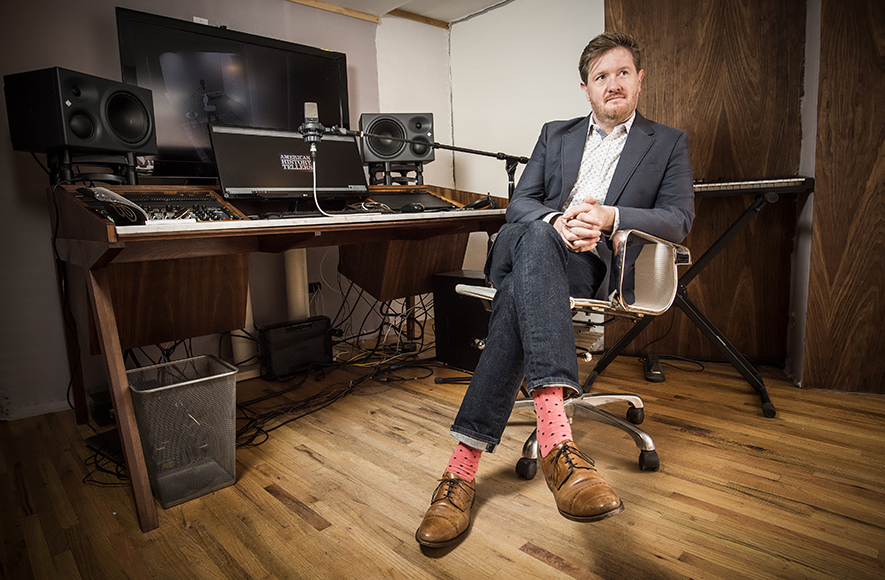How Lindsay ‘Not the Senator’ Graham found his voice
Back in high school, Lindsay Graham aka “Not the Senator” was your standard geek with a penchant for listening to, writing and making music. His genre partialities run the gamut — Beatles, Stones, Zeppelin, Miles Davis, Tom Waits — and inspired his life’s soundtrack.
He launched a local music podcast long before Ira Glass made the medium mainstream. Graham played (primarily) guitar in Timmy and the Sinister Clan, a teenage “circus-y rock band” that coined seven original songs and played exactly two shows, Graham says. These ventures, as such, propagated little popularity or prosperity, but his passion-driven pursuits put him on a path leading there.
Serendipity and imprecise preparation proved pivotal to Graham’s current success as the host of the hit podcast “American History Tellers.”
Perhaps it arose with Comedy Central’s “Drunk History,” wherein a cast of celebrities reenacts historical events while an inebriated guest-star narrates, or Lin-Manuel Miranda’s portrayal of Alexander Hamilton as a plucky, sharp-witted, rapping/singing, swaggering bad-boy romantic.
Whatever the root, history went hip.
“I hadn’t thought about the history-as-being-trendy angle,” Graham says, considering the suggestion. But he is aware of a closely related societal shift: “The acceptance of nerd culture.”
He expounds, “You can be as geeky as you want today. We have license to publicly show enthusiasm for history” … or science and topics once reserved for dudes who sat alone at lunch.
Then there was the great podcast craze of 2014. It came some years after Graham graduated University of Mary Washington in Fredericksburg, Virginia (the town fueled his fascination with American lore).
Graham’s aforementioned audio outfit operated in an East Dallas home and secured work for Wondery, a podcast network started in 2016. Today it claims some of its industry’s biggest buzz building shows.
But this was before Wondery became the “prominent podcast producers,” as USA Today puts it. Eventually the Wondery crew beckoned Graham and his inviting baritone voice to narrate “American History Tellers.” He could compose the score, an essential piece of podcast production, too. He recognized the catchiest podcasts “possessed a certain musicality,” proper pacing, he says.
A paid opportunity to combine his foremost obsessions and skills? “I grabbed it,” he says.
Graham dubs the series “pop history, rooted in entertainment.”
Its stupendous reception is a testament to powerful storytelling.
“Imagine you’re a tavern keeper in Liverpool in year 1776 …” “Imagine it’s 1794. You’re a Scottish immigrant …,” — this is Graham’s trademark intro. What follows is an examination of critical events, eras and people that shaped the United States, delivered by your coolest-ever and most sanguine professor — he maintains this infectious faith that we still can learn from our past and live better.
Graham — and his relatively small team of researchers, writers, editors — turns lessons about the Cold War, space race and prohibition, for example, into dramas with complex characters, binge-worthy plots. Storytelling sans imagery can be challenging, he says. He feared the National Parks episode might be a bore without those majestic visuals Ken Burns had at his disposal. He was wrong. Now a six-part series, “It turned out amazing.”
He voices episodes out of the East Dallas studio and lives near White Rock Lake with wife Libby and 3-year-old daughter.
He doesn’t plan to move to L.A. seeking superstardom, he says, though he did fly there once to meet the Wondery team. “That was a great experience,” he says. “It upped everyone’s motivation.”
A new podcast, “American Scandal,” is on the horizon. “The format will be similar [to AHT], but we dive deeper into scandalous, salacious events,” Graham says. Think steroids corruption, Eliot Spitzer, Iran Contra.
“I got in early,” he says. “It’s been a ride.”






